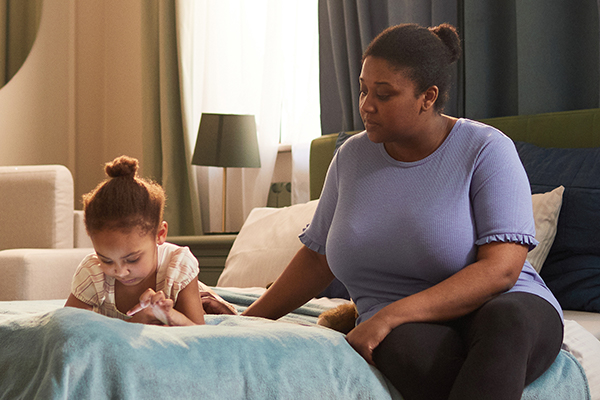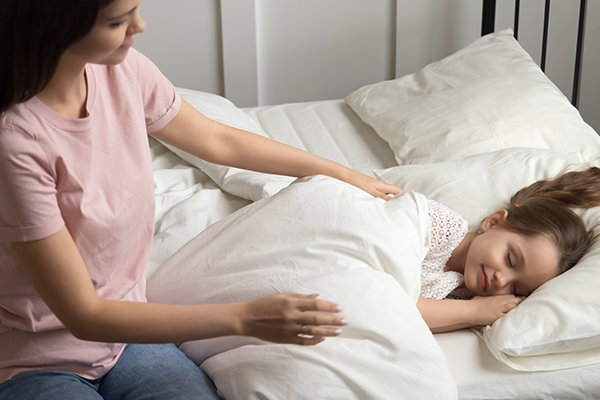Bedwetting is frustrating!
We eagerly watch our children reach their milestones, patting ourselves on the back with pride at a job well done. (Or, you should be doing this—parenting is too hard not to give yourself credit on the regular.)
Likewise, we moms also have milestones! One of which is the last day we ever have to buy diapers, right, momma? The thought of saving money and not having to worry about packing a bag with diapers and wipes is pure bliss.
Potty training is a process, and while that process takes effort, patience, loss of sleep, and sometimes tears, the result is so worth it. However, what happens if your child is potty trained but is now wetting the bed?
Parents who have to process bedwetting begin to ask themselves a slew of questions, such as, “Why is this happening?! What can I do to stop this?! What are my next steps?! Is there something wrong with my child?!”
All normal questions! 
When Bedwetting is a Medical Concern
Of course, you want all the answers, but sometimes, to obtain those answers, you must go through trial and error to get to the root of the problem.
Before you panic or get angry with your child, rest assured, bedwetting is considered normal. It happens to many kids (up to 15% of all kids experience bedwetting, and boys more than girls), and even though it’s incredibly frustrating, there are a few things to help deal with the issue, according to Children’s Health℠.
First, check for any underlying medical issues that could cause bedwetting, such as fever, fussiness, pain below the belly button, or your child complaining of burning when they urinate during the day. Those could be a sign of a UTI.
Daytime urinating might be a sign of Type I diabetes. If this is an issue in addition to nighttime bedwetting, talk to your doctor.
Besides a medical issue, your child may experience bladder-bowel dysfunction. That simply means your child has difficulty urinating or passing stool during the day. 
Children’s Health’s Tips to End Bedwetting
First, don’t panic, and don’t reprimand your child. That will make matters worse, and shaming will be more damaging than the actual bedwetting. Remember, they can’t help it, and it’s a typical problem that will go away. Bedwetting isn’t your fault, and it isn’t your child’s fault.
With patience, support, and plastic mattress covers, you can work with your child to grow out of the bedwetting stage. Not only will this ease your stress level, but sleeping through the night without an accident will also boost your child’s confidence and ensure a better night’s rest.
There are preventative measures you can take to help your child have a dry night’s sleep and end bedwetting:
- Limit drinks after 6pm. Stay hydrated during the day so you can cut off liquids in the evening.
- Have your child use the restroom before bed, even if they say they don’t have to go! Get them into the ritual of going before they hit the sack.
- Place a potty seat next to their bed. This will encourage them to get used to using a potty at night and eventually help them take steps to get to the bathroom!
- Keep a routine. Maintaining a regular bedtime helps keep your child on a schedule. Their bodies will adapt! If a child is in a deep sleep due to being overtired, the chance of a bedwetting accident increases.
- Praise, praise, praise! Whether your child has an accident-free night, uses the potty seat, or goes longer throughout the night before having an accident, let them know how well they are doing! Boost their spirits.
- Buy a bed alarm. This attaches to your child’s underwear and wakes them up when they wet the bed. Even if they have already wet the bed, your child should still get up and go to the potty to create a new habit in their brain.
- Talk to a pediatrician about medication. These are effective in the short term; however, once a child stops the medication, they will most likely start bedwetting again. Therefore, it’s best to retrain the brain whenever possible and use medication as a last resort.
Children’s Health is here to provide awareness and education for all kinds of developmental and medical issues in kiddos, in an effort to keep all families and kids healthy and happy at every age and stage. For more information on bedwetting, check out Children’s Health. (link here?)













